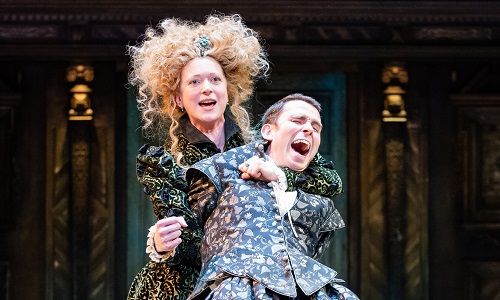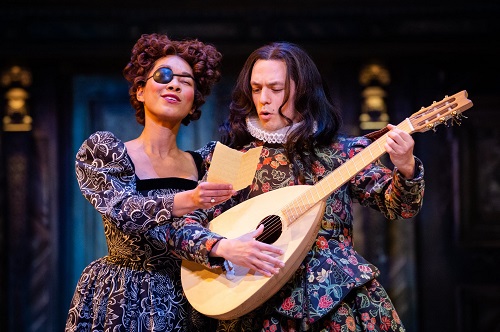 United Kingdom Shakespeare, The Taming of the Shrew: Royal Shakespeare Company, Barbican Theatre, London, 20.11.2019. (CS)
United Kingdom Shakespeare, The Taming of the Shrew: Royal Shakespeare Company, Barbican Theatre, London, 20.11.2019. (CS)

Creative team:
Director – Justin Audibert
Set Designer – Stephen Brimson Lewis
Costume Designer – Hannah Clark
Lighting Designer – Matt Peel
Composer – Ruth Chan
Sound Designer – Claire Windsor
Movement Director – Lucy Cullinford
Fight Directors – Rachel Bown-Williams, Ruth Cooper-Brown
Cast:
Baptista – Amanda Harris
Katherine – Joseph Arkley
Bianco – James Cooney
Petruchia – Claire Price
Hortensia – Amelia Donkor
Gremia – Sophie Stanton
Lucentia – Emily Johnstone
Trania – Laura Elsworth
Biondella – Amy Trigg
Vincentia – Melody Brown
Grumio – Richard Clews
Curtis – Charlotte Arrowsmith
Servant of Petruchia – Aaron Thiara
Pedant, a merchant – Hannah Azuonye
Widower – Leo Wan
Tailor – Michael Patrick
Haberdasher – Alex Jones
Servant of Baptista – Alexander Mushmore
What is the male equivalent of a ‘shrew’? That “forward” woman, or “fiend of hell”, prone to “scold and raise up such a storm/ That mortal ears might hardly endure the din”, as Shakespeare puts it?
In one sense, there can be no masculine counterpart: for the insulting identifier is one half of the parallel pair which form a patriarchal fiction of femininity – a fiction which, in the first scene of Shakespeare’s The Taming of the Shrew labels Baptista’s eldest daughter Katherine as “stark mad or wonderful forward” for her angry assertions of agency, while the younger Bianca is defined by her maidenly “mild behaviour and sobriety” and admired for fulfilling standards of feminine virtue which are just as much a fantasy of the self-entitled male imagination.
But, this does not worry director Justin Audibert whose RSC production explores, he explains, “what happens when you get female actors to play traditionally powerful male roles, and vice versa”. And, it’s understandable that present-day directors and actors look for new ways to stage Shrew, which dramatizes, and perhaps implicitly criticises – one’s view will depend on whether one judges Shakespeare to have been a subtle manipulator of masculine consciences or a macho misogynist – the mores of an age in which scolds’-bridles and whore-whipping were communally sanctioned ways of publicly ‘correcting’ rebellious women. Today, it may be private wife-beating rather than public witch-burning that we censure. And, interestingly, the play itself suggests that the former was no more acceptable in Shakespeare’s day, for when Katherine strikes Petruchio, goading him to respond, “I swear I’ll cuff you, if you strike again”, her riposte mocks his status as a gentleman: “So may you lose your arms:/ If you strike me, you are no gentleman;/ And if no gentleman, why then no arms.” But, if the domination that Shakespeare’s Petruchio exerts over his wife as he seeks to ‘tame’ her into submission is brutally coercive rather than openly violent, it would still be condemned today as domestic violence.
So, to evade such knotty problems, this Padua, declares Audibert’s production, is no patriarchal dominion. Instead, the genders (and the text’s respective pronouns) are flipped: here, women don’t just rule the roost but reign in public too. Sword-bearing womenfolk strut and swagger through the Paduan streets. Names are tweaked: Baptista Minola (Amanda Harris) is determined to marry off her quarrelsome elder son (James Arkley), before she lets the handsome and much-wooed Bianco (James Cooney) take his pick from his lascivious, occasionally loopy, admirers. The arrival of Petruchia (Claire Price) seems to offer the barmy matriarch Baptista a solution to the stalemate caused by her irksome elder boy’s obstinance and irascibility. Petruchia is a fortune-hunter, which seems slightly out-of-kilter with the production’s feminist tilt – and I missed whether or how Audibert alters her declaration, “I come to wive it wealthily in Padua”: “I come to husband it hopefully” doesn’t quite have the same ring – but she has her eye on the eldest son’s dowry (another false note) and sets out to ‘tame’ him into submission.
That Baptista’s eldest son retains a feminine name, Katherine, but is given a short-back-and-sides haircut which contrasts with the flowing locks of Bianco and his fellow Hilliard-ian ‘young-men-among-the roses’, defied my powers of hypothetical or theoretical explanation. A feisty and full-throttled ‘Katherine’ who usurps masculine traits … what’s new? Moreover, switching the genders often uproots the text. When Arkley’s Katharine asks, “Why are our bodies soft and weak and smooth,/ Unapt to toil and trouble in the world”, his tall, taut and wiry frame speaks otherwise. And, when bawdy male jokes tumble from women’s mouths, they make little sense.
Stephen Brimson Lewis’s set brings the Globe Theatre indoors: we have a gallery, Lord’s rooms and Gentleman’s rooms (housing musicians), painted ‘Heavens’ and Frons Scenae, and the colour-flecked wooden floor intimates a rush covering. Judging by the rich Renaissance visual pageant, this Elizabethan matriarchy seems to have been inspired by the so-called cult of Gloriana, although the Virgin Queen-Warrior Prince iconography designed to perpetuate Elizabeth I’s public reputation during her reign and beyond was carefully managed by her male courtiers and politicians (and sixteenth-century public relations exercises, lacking the benefit of social media, probably reached few of the populace in any case).

Essentially, though, given that modern audience’s struggle to find humour in the central antagonism of this ‘comedy’ – the dialect between male debates about and female enactments of ‘femininity’ (or, in this case, the gender-reverse) – Audibert places the emphasis on the comic side-show. And, the caricatures and capers do conjure plentiful chuckling, as zany exhibitionism takes the place of Shakespeare’s serious, often troubling, dialogue and debate. Sophie Stanton’s Gremia glides with seraphic grace, as if on castors, while engaging in superciliary extravagances through which Stanton intimates Gremia’s outlandishness and lasciviousness. Laura Elsworthy’s Trania flourishes one arm flamboyantly aloft every time she speaks, as if she is about to launch into a fandango. Cooney tosses his locks and flounces flirtatiously, even though Bianco is admired as ‘fair and virtuous’, while his brother insults Bianco’s suitors with vulgar forearm jerks.
I could have lived with the capriciousness, even idiocy, that seemed drawn from book of Blackadder, if Shakespeare’s text had itself had been respected and enunciated with due care. But, just as characters raced in and out of the tiring-room doors with the exuberant energy of Carry On extras, so too many cast members scrambled through the lines, at high speed and high volume. That said, this is a lovely production to look at. Hannah Clark’s costumes offer a surfeit of plum, olive, purple and black luxury, topped off with creative coiffures and gleaming jewels which glow richly and warmly under Matt Peel’s softening lights. A new score composed by Ruth Chan blends modern bass beats with Renaissance rhythms and recorders, providing jolly continuity jingles which link the pacy scenes.
There is some strong and clear characterisation. Claire Price’s Petruchia is boyishly boisterous rather than a brute who believes that marriage is based on “awful rule and right supremacy”, her bird’s-nest curls wild and unruly but suggesting playfulness rather than the menace of a Medusa. Amanda Harris’s Baptista is a matriarch seemingly hovering on the edge of derangement, and Emily Johnstone Lucentia is no less loopy. As a terrific Grumio, Richard Clews never overplays hand, and his lines, however superficially flippant or foolish, are underpinned with poetic clarity and grace. As the eponymous shrew, Joseph Arkley delivers the text with similar dignity, though this Katherine seems a strangely subdued scold, introverted rather than ill-tempered, a withdrawn loner rather than the wildcat who breaks a lute over the head of the disguised Hortensia (an often eloquent Amelia Donkor) or who meets Petruchia’s provocations with an aggressive physical riposte. He may be starved of food and love, but as he gnaws avidly on a chicken-leg, it’s somehow hard to root for this Katherine.
And though his final speech was finely delivered, here Katherine’s obedience and passivity drew from the Barbican audience sniggers which would surely seem sinister in the original context, when they rhetorically confirm acceptable feminine virtues. Arkley’s Kate is Petruchia’s chattel, physically and psychologically: abuse is abuse, whatever the gender of the tamer and the tamed – and it’s not funny.
In the event, Audibert’s production has less to say about gender relations than about human nature. One might similarly ask, if the schoolchildren fighting for survival on Golding’s island in Lord of the Flies were girls rather than boys, would the outcome be less vicious and violent? The answer is likely, no. Those with power – and with a pompous sense of entitlement to match – abuse power simply because they can.
Claire Seymour
For more about the RSC click here.